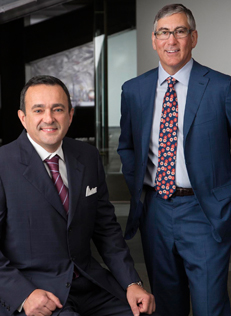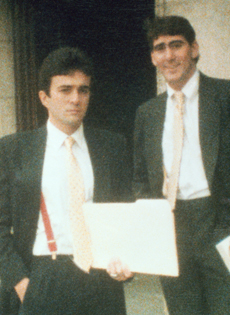© 2014 The Texas Lawbook.
By Mark Curriden, JD
Senior Writer for The Texas Lawbook
HOUSTON (June 4) – Houston trial lawyer John Zavitsanos received an email on Saturday morning in 2009.
“This is probably going to be a surprise to you, but…”
The email came from National Oilwell Varco General Counsel Dwight Rettig, who had sued Zavitsanos’ client, A&B Bolt and Supply, for $33 million in a bet-the-company trade secret case only a year earlier.
On cross-examination, Zavitsanos destroyed Houston-based NOV’s key executives and A&B won the case. The GC of NOV was the last person Zavitsanos expected to contact him.
“I told John that I learned my lesson and that I now needed him and his team on my side in an upcoming case,” says Rettig. “It was the first and only time I’ve ever hired a law firm that had beaten us in court.”
Zavitsanos and his law partner Joe Ahmad now represent NOV in various litigation disputes, including a major trade secrets lawsuit the company is fighting against oilfield services giant Schlumberger Ltd., which is headed to court in July.

Ahmad and Zavitsanos met on their first day at the University of Michigan School of Law in 1984. Both moved to Houston to join law firms. Ahmad practiced at Crain, Caton & James, while Zavitsanos joined Baker Botts in 1987.
In 1993, they decided to start their own law firm. They had no clients, no revenues and no savings. The only office space they could afford was a rickety old building that the landlord gave them for free in exchange for representing them in court.
“When it rained, we had to put a bucket next to our desk to catch the water,” Zavitsanos says. “We finally had to move because the building was condemned.
“We had no idea how to run a law firm at the start,” he says. “Payroll was due on Thursdays and we would be very happy when a check came in the day before to cover those checks.”
Much has changed in two decades. The firm – officially named Ahmad, Zavitsansos, Anaipakos, Alavi & Mensing or AZA for branding purposes – now has 31 lawyers plus more than a dozen staffers. They occupy the entire 34th floor of One Houston Center and are eyeing additional space to expand to about 50 lawyers within the next couple years.
Gross revenues in 2014 are expected to exceed $25 million. The firm is now recruiting law students at Harvard, the University of Chicago and, of course, the University of Texas.
AZA is Exhibit A in the legal community’s quickly evolving landscape that has large and medium-sized companies turning to litigation boutiques instead of large corporate law firms to handle their business disputes and to fight for them in court.

“Litigation boutiques are gaining more and more popularity for exactly those reasons,” says Rettig. “Sometimes I need the large law firm because the case requires expertise in tax and securities and multiple areas of legal specialty.
“But sometimes, I just need the best trial lawyer in Harris County and I don’t want to pay for all the overhead that comes with having a law firm with offices around the globe,” he says.
Rettig and other corporate general counsel say that litigation boutiques, especially AZA, seem to be less hesitant to push lawsuits to trial.
“I find that many large law firms are willing to capitulate too quickly and pressure me to settle too soon,” says Lawrence Dreyfuss, the general counsel at Plains All American Pipeline. “I want the other side in a lawsuit to know that I’m serious about going to trial, and I know that John, Joe and the folks at AZA are serious about going to trial.”
Dreyfuss, who employs a handful of law firms for various transactional and regulatory matters, says he uses Vinson & Elkins litigation partner James Thompson for many matters, but that V&E, because it is so big and represents so many energy companies, frequently has conflicts and is unable to be involved in a lawsuit.
“The AZA lawyers are tenacious, have fewer problems with conflicts of interest and are very good trial lawyers,” Dreyfuss says. “So, I call on John and Joe a lot.”
David Bernal, the assistant general counsel for litigation at Houston-based Apache Corp., says he would hire Zavitsanos and Ahmad no matter where they practiced.
“We don’t hire law firms – we hire lawyers that we like, lawyers we respect and lawyers who do a good job for us,” says Bernal. “I turn to John and Joe because they bring a plaintiff’s and a defense perspective and they are never afraid to take a case to trial.”
During the past 20 years, Ahmad, Zavitsanos and their lawyers have handled more than 100 jury trials, including seven already in 2014. The firm has a half-dozen other cases set for trial later this year.
“Cases go to trial for two primary reasons: The case is not about money but there’s a personal element or a business philosophy involved or someone has misjudged the value of the case,” Zavitsanos says.
The law firm’s first client was Buddy Moore, a truck driver for Exxon who had been severely beaten with a tire iron by criminals while he was on the job. Moore suffered head and brain injuries, leaving him disabled.
Exxon tried to find Moore another job that he could do with his disability, but nothing worked out and the company finally dismissed him.
Ahmad sued Exxon under the Americans with Disabilities Act. The Irving-based company offered $5,000 to settle the case, which Ahmad says he thought was reasonable.
“Buddy told me that God would help him do better,” says Ahmad. “Sure enough, the jury came back with a six-figure award – $130,000.”
About the same time, Fort Bend County deputy sheriff Kenneth Brady walked into their law offices without an appointment. Brady had been fired by the new sheriff because the deputy supported a political opponent.
“We claimed the firing was retaliation for the deputy expressing his First Amendment rights,” says Ahmad.
Ahmad and Zavitsanos worked on the case for four years, finally getting it to trial. The court awarded $2 million in damages to the deputy and $750,000 in lawyer fees.
“We thought we were rich,” says Ahmad. “It was more money than we had ever seen.”
“When John and I have tried a case together, we have never lost,” says Ahmad. “We started this law firm on the premise of taking risks.”
In 1998, the duo tackled its most controversial case when they represented Luis Mota, a professor of dentistry at the University of Texas Health Science Center, in the first ever same-sex harassment and retaliation case in Texas.
Following a six-day trial, a federal jury in Houston in 1999 found in Mota’s favor and awarded $433,000 in damages. U.S. District Judge Vanessa Gilmore added another $388,000 in legal expenses.
Many general counsel say there is another significant reason that litigation boutiques such as AZA are growing: lower hourly rates and more flexibility in alternative fee arrangements.
The top hourly rate at AZA is $645, which is at least $150 less than senior litigation partners charge at the large full service law firms.
Zavitsanos says the firm is definitely open to alternative fee structures.
“We represent a company that owns 150 car dealerships,” says Zavitsanos. “We told them that if we didn’t get the temporary restraining order the company needed, we would be paid only 20 percent of our hourly rate, but if we were successful, we would get 150 percent.”
National Oilwell Varco isn’t the only large business to hire AZA after facing its lawyers in court. Ahmad and Zavitsanos went to trial in two separate cases against Citgo Petroleum Corp. and beat the oil giant both times.
Only a few months after the second trial, an assistant general counsel for Citgo called Zavitsanos.
“She said she was in a mediation and wanted some advice,” says Zavitsanos. “The assistant GC told me the fact pattern and I told her that it is a bullshit case and worth $100,000 at most. She told me that her counsel from a large law firm was advising her to accept a settlement offer six times that amount.
“She sent me the case file immediately and we resolved the case for even less than I had advised,” he says.
Citgo is now a major client of the firm.
“There have been several times when we have been hired by clients just two or three weeks before the trial is scheduled to start,” says Zavitsanos. “Usually, the case has been handled poorly, the case file is a mess and the judge is antagonistic because the case has been going on forever and is so screwed up.”
That was the situation in the case that is AZA’s biggest dollar court victory.
In 2011, Austin-based Versata Software hired the firm in its huge patent infringement case against global software company SAP America only two months before the case went to trial.
Dallas-based McKool Smith was lead counsel on the case but Versata leaders asked AZA to develop the company’s lost monetary claims by working with financial experts to present a damage model to jurors.
The East Texas jury awarded $345 million in damages, which the judge later increased to $392 million due to pre-judgment interest.
Rettig and other general counsel say Ahmad and Zavitsanos are particularly impressive in their preparation for trial and their courtroom presence.
For example, they often tell jurors not to worry about pronouncing the name of their law firm. “Just think of us as two Greeks and sheik,” they say.
“We are very ethnic – a lot of our people are first or second generation Americans,” Zavitsanos says. “We operate like a family with passion, but not in the Hallmark card way. When we have disagreements, it is nuclear war, just like a family. But we trust each other, too.”
The firm has no partnership agreements and keeps no origination documentation.
“We will never merge with another law firm and we will never open an office in another city,” Zavitsanos says. “Money is the consequence of what we do, not the reason we do it.”
© 2014 The Texas Lawbook. Content of The Texas Lawbook is controlled and protected by specific licensing agreements with our subscribers and under federal copyright laws. Any distribution of this content without the consent of The Texas Lawbook is prohibited.
If you see any inaccuracy in any article in The Texas Lawbook, please contact us. Our goal is content that is 100% true and accurate. Thank you.
